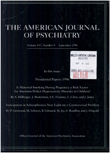Reduction of suicidality during clozapine treatment of neuroleptic- resistant schizophrenia: impact on risk-benefit assessment
Abstract
OBJECTIVE: Suicide has been reported to occur in 9%-13% of schizophrenic patients. It has been suggested that neuroleptic- resistant or neuroleptic-intolerant schizophrenic patients are at higher risk for suicide than neuroleptic-responsive patients. Clozapine is the treatment of choice for neuroleptic-resistant patients, but its use has been greatly limited because of its ability to cause potentially fatal agranulocytosis. The purpose of this study was to compare the suicidality of neuroleptic-resistant and neuroleptic- responsive patients and to determine if clozapine treatment decreased suicidality in the former group. METHOD: Prior episodes of suicidality were assessed in a total of 237 neuroleptic-responsive and 184 neuroleptic-resistant patients with schizophrenia or schizoaffective disorder. Eighty-eight of the neuroleptic-resistant patients were treated with clozapine and prospectively evaluated for suicidality for periods of 6 months to 7 years. RESULTS: There was no significant difference in prior suicidal episodes between neuroleptic-responsive and neuroleptic-resistant patients. Clozapine treatment of the neuroleptic-resistant patients during the follow-up period resulted in markedly less suicidality. The number of suicide attempts with a high- probability of success decreased from five to zero. This decrease in suicidality was associated with improvement in depression and hopelessness. CONCLUSIONS: These results suggest a basis for reevaluation of the risk-benefit assessment of clozapine, i.e., that the overall morbidity and mortality of patients with neuroleptic- resistant schizophrenia are less with clozapine treatment than with typical neuroleptic drugs because of less suicidality. This conclusion also has implications for increasing the use of clozapine with neuroleptic-responsive patients.
Access content
To read the fulltext, please use one of the options below to sign in or purchase access.- Personal login
- Institutional Login
- Sign in via OpenAthens
- Register for access
-
Please login/register if you wish to pair your device and check access availability.
Not a subscriber?
PsychiatryOnline subscription options offer access to the DSM-5 library, books, journals, CME, and patient resources. This all-in-one virtual library provides psychiatrists and mental health professionals with key resources for diagnosis, treatment, research, and professional development.
Need more help? PsychiatryOnline Customer Service may be reached by emailing [email protected] or by calling 800-368-5777 (in the U.S.) or 703-907-7322 (outside the U.S.).



